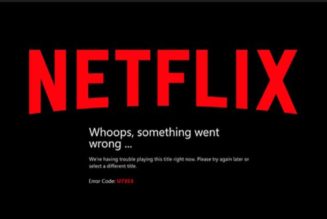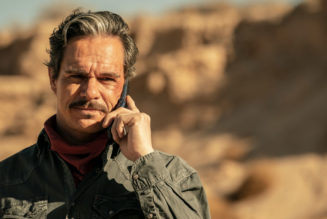Warning: This story contains descriptions of traumatic events, including sexual assault, which some readers might find upsetting.
By Steven Underwood
In the eighth episode of I May Destroy You, the harrowing BBC drama brought stateside by HBO Max, the series’s star character, Arabella, played by showrunner Michaela Coel, finds herself looking to the camera, her head wrapped in a colorful scarf, and speaking to a support group for survivors of sexual assault. But what she has to say isn’t heartfelt or healing, but rather a definitive declaration of war against “Bob,” who stands in those who have socialized a deceptive kind of violence.
“He’s gone exploring to see for himself what boundaries and violations these women might be banging on about because ‘Bob’s’ thorough… ‘Bob’ found the line that separated him from everything else,” she says, chillingly describing the tenuous gray areas and power manipulations that make violence possible, or even excusable: “Rather than crossing it [the line], he tiptoed on it. … We couldn’t pinpoint exactly what it was he did that we felt was so wrong.”
 Natalie Seery/HBO
Natalie Seery/HBOCoel’s ironically comedic drama doesn’t deliver a single moment of fear, only the thick film of anxiety. From the first episode in its freshman season, Coel weaves a maddening descent through delirium, exploring a writer’s sexual assault and her journey to define recovery for herself. The show isn’t about justice — the viewer is never made to be concerned with the crime as much as with Arabella’s shifting truths — but repeated confrontations with trauma and the ways the world enables the creation of new survivors every day.
According to the National Sexual Violence Resource Center (NSVRC), one in five women and one in six men are victims of sexual assault. This is a commonly acknowledged statistic that does little to contextualize how real the experience is for survivors. Arabella’s speech is reflective of Coel’s overall storytelling, which cuts through the harshly tread realities of these statistics to the heart of the issue: rape culture. Rape culture is a setting where sexual assault is normalized and excused by the conscious and unconscious actions and beliefs of the majority. It has created many circumstances where becoming a survivor is a probability for many people but rarely equips people with the reality of what normalcy becomes afterward.
And this culture definitely isn’t addressing the many ways abusers have industrialized the gray area of sexual assault by eluding informed intention for sexual acts and, of course, informed consent. Sexual assault is commonly understood as purely penetrative violence or the use of intimidation, but it can appear as subtle coercion, grooming, or in some cases, subterfuge. It appears as whatever means an abuser can use to coerce sex from another party despite their refusal or hesitation. Many abusers may mask their actions as well-meaning and understandable.
What else are we meant to take away as we watch Arabella’s best friend, Terry (Weruche Opia) in Episode 3, experience concerning sexual dishonesty with two men she meets while vacationing in Italy, the “most freeing thing [she] has ever done?” They invite her into a threesome under the presumption of spontaneous excitement. However, as the viewer knows, these men had laid a trap for Terry from the moment the friends laid eyes on her wandering down the streets of Italy. It’s clearly predatory in intent, but in the end, Terry can only see herself as betrayed as they walk off into the night when everything is done.
 Natalie Seery/HBO
Natalie Seery/HBOOr take Kwame (Paapa Essiedu) in Episode 4, who is clearly and violently assaulted post-hook-up with a man he had previously consented with and is promptly gaslit by the cops to whom he reports the assault. According to the National Intimate Partners and Sexual Violence Survey, “40 percent of gay men and 47 percent of bisexual men have experienced sexual violence other than rape, compared to 21 percent of straight men.”
Like Arabella, I am a survivor of sexual assault. The first instance occurred in my childhood, but the second occurred when I was seventeen with an adult man, a “Bob,” who groomed me for a year. He led me to believe he is my friend, with the explicit desire to subtly convince me to forego my virginity with him, though aware of the cruciality of our age difference and my emotional vulnerability.
To this day, I’m troubled by the initial excuses I conjure to second-guess my experience: the deception, and the psychological tailspin that the loss of my virginity, which I cherished simply as an artifice I assumed would be with someone who cared enough about me, was a sexual assault. The NSVRC finds that each survivor reacts to sexual violence in her or his own unique way, from expressing emotions or disassociation, internalizing physical responses to the assault or developing coping mechanisms that could be harmful, or otherwise unhealthy. Arabella does all of these things; Kwame and Terry do all of these things; I do all of these things.
The difficult mess of healing is frequently glossed over in media depictions in favor of creating compelling drama. But healing is not cut and dry and it has no time frame. Arabella’s journey to safe healing is far from easy. In Episode 2, just two days following her sexual assault and hours wandering around London, clearly debilitated, with a fresh wound on her forehead, she navigates the reality of her stolen memory and new normal as a survivor. She consistently flees the truth of what happened until eventually, when in the hospital, undergoing a rape kit, she breaks down and accepts the reality.
 Laura Radford/HBO
Laura Radford/HBOWhy does everyone want to see a strong survivor? Being a survivor has nothing to do with other people’s perceptions of your strength. Being a survivor sometimes feels like you are your own ghost responsible for your own haunting. You can’t forget, you want to forget, you’re terrified of forgetting.
I was 16 when I first confessed my childhood traumas to my two closest friends one summer in Columbus, Ohio. While the confession was healing, I said it didn’t affect me, and I didn’t call myself a survivor. Nevermind that the truth that touch now made me uncomfortable; the damage impacted me and never seemed keen on stopping for as long as I ran from it.
During the healing process, lingering hurt can appear in self-reflection, too. Perhaps that is why I May Destroy You manifests Arabella’s healing in Episode 4 through therapy, self-care and eventually, Arabella’s eventual return to her sexuality only after Episode 3’s flashback story, where viewers are reminded of a happier, jovial, and party scene-committed Arabella abandoned by Terry at a club. This pattern is replicated in Episode 6, where we explore the web of victimization that occurs where few are “not guilty,” but everyone has suffered abuse.
The episode flashes back to teenaged Arabella and Terry in the early 2000s. It’s an episode with as many teen misconceptions on consent and sexual agency as there were legitimate violations, centering Arabella’s former classmate and current sexual assault counselor, Theodora (played by Harriet Webb and, as a high schooler, Gaby French). Young Theodora stages a sexual assault to implicate a Black classmate, Ryan, after he photographs her during sex without her consent. No one in this situation is innocent: Theodora is guilty of using her privilege as a white woman to endanger a Black man; Ryan did assault Theodora; Arabella and Terry slut-shamed Theodora, upholding a strong Black line because “the [nude] shots don’t lie.” By the end of the episode, the question of survivor and abuser is more complex than ever before.
 Natalie Seery/HBO
Natalie Seery/HBOPerhaps what helps I May Destroy You transcend the nature of other series like 13 Reasons Why which are criticized as “trauma porn,” or media that exploits the traumatic adversity of lives for entertainment, is that it does not sacrifice a character’s troubling facets. This is likely because this story is based on Coel’s own true story. “The narrative is constantly turning situations and ideas around, looking at them from another angle, and confounding expectations,” Coel said in a cover profile by Vulture. “Characters are not always what they seem, and their arcs aren’t straightforward; they twist, wind, and loop back in on themselves. The show is never prescriptive in its ethos; everyone… contains within themselves light and dark, victim and perpetrator.”
In Episode 9, a Halloween paint-and-sip turns sour when Arabella, driven into a tailspin at the new wound of her sexual assault case being officially closed, is confronted with her own dangerous and toxic habits. Just a month prior, Arabella locked Kwame, reeling from his own sexual assault, inside a room with a stranger. Eventually, Arabella concedes that she herself was guilty of creating an unsafe environment for her own friend and realizes how far from healing she drove herself. Arabella apologizes, but seemingly returns to the very first square of her healing journey.
“What does closure look like?” Coel wondered in the Vulture feature. “It’s not that it ends. For me, I look at the last four years and I feel this overwhelming sense of euphoria and pain.” The truth of I Make You Destroy has little to do with the fact it is discussing rape culture and more with how it positions survivors within a nuanced net of experiences. By the end, the story is not about who’s the survivor and who’s the perpetrator: It’s about finding the ground after a disruption and the light within the murky path towards healing.










